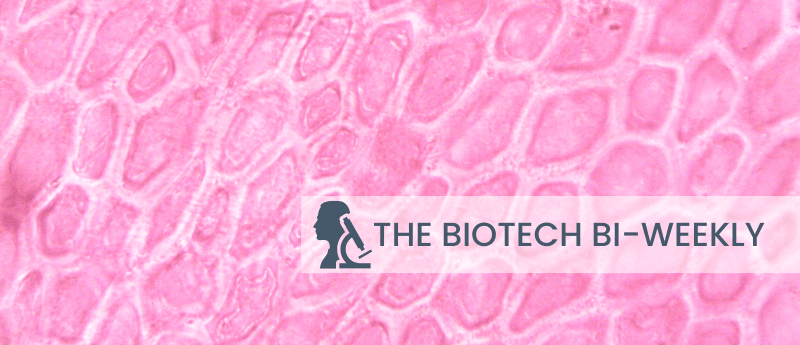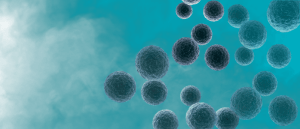The biotech bi-weekly: better cell media and culture solutions for drug development, and AI takes center stage to secure funding

This week, PCR diagnostics could get even quicker, lipid nanoparticles more customizable and lab data management simpler, while cell media and culture systems improve for the development and implementation of cell therapies, and AI solutions for antibody design and in silico cell modeling advance.
Products
New sustainable cell culture system eases translation from research to production
Green Elephant Biotech (Giessen, Germany), the world’s first producer and distributor of lab consumables made from plant-based plastics, has released a scaled-down version of its CellScrew® cell culture system, the CellScrew® mini.
This system is more appropriate for the research phase of cell and gene therapy development, reducing inefficiencies introduced when switching from one culture system to another when moving into the manufacturing phase of a therapeutic. The CellScrew® mini is made of polylactic acid (PLA), a plastic made from cornstarch, reducing the CO2 emissions associated with production and offering a sustainable option for developers and manufacturers.
Read more about the CellScrew® mini here>>>
Improved capabilities for lipid nanoparticle synthesis
ABITEC Corporation (OH, USA), specialists in lipid manufacturing, have released a new suite of capabilities for custom synthesis, now including the production of high-purity lipids for lipid nanoparticle (LNP) therapeutics.
Many vaccines and advanced therapies in development rely on LNPs as their delivery vesicles and for targeting. However, these LNPs need to be of exactingly high quality and designed to intricate specifications. These new capabilities are designed to tackle these challenges, allowing the production of ultra-pure custom lipids from mg to kg scale.
New, less cytotoxic cryopreservation media released
Nucleus Biologics (CA, USA) has released a new cell culture media for cryopreservation. Many media designed for this purpose use the cryoprotective compound dimethylsulfoxide (DMSO). However, DMSO can be cytotoxic, reducing the viability of cells stored within it and presenting potential issues for the preservation of cells destined for a clinical purpose.
This new media, named NB-KULTM DF, is DMSO-free but retains the performance of DMSO-based media for cryopreservation.
 Nature knows best: mimicking natural cryoprotectants for preserving cell-based assays
Nature knows best: mimicking natural cryoprotectants for preserving cell-based assays
Here, we learn about a breakthrough technology that cryopreserves cells in experiment-ready formats, making strenuous cell culture protocols a thing of the past.
Partnerships
New PCR diagnostic on the horizon after acquisition
Access Genetics (MN, USA), a diagnostic company, has acquired Sensible Diagnostics (CA, USA) and with it, a rapid PCR testing technology. The company hopes to optimize this technology to deliver a test that can produce diagnostic results from saliva in 10 minutes or less.
Bioinformatics and lab information management platform aids large research center
The Ellison Institute of Technology (EIT) Los Angeles (CA, USA) has taken on the services of Sapio Sciences (MD, USA), a lab informatics platform, to centralize sample management, improve data integrity and increase efficiency across its DNA sequencing and other laboratory workflows.
Commenting on the integration of the company’s Laboratory Information Management System, the EIT’s Director of Information Technology – Frank Callari – stated that, “The Sapio platform has provided us with the flexibility and scalability needed to handle the diverse and evolving nature of our research projects. Sapio’s unified system allows us to streamline our operations, from inventory tracking to collaboration among our multidisciplinary teams, significantly improving our workflow efficiency.”

Illustrations of Nobel Laureates by Niklas Elmehed. © Nobel Prize Outreach.
Who won the 2024 Nobel Prize in Chemistry?
This year, the Nobel Prize in Chemistry has been awarded in half to David Baker for computational protein design and half jointly to Demis Hassabis and John Jumper for their creation of an AI model that can predict protein structure.
People and publications
AI-based biotech secure seed funding for aging research
Shift Bioscience (Cambridge, UK), a biotech company exploring aging through the lens of gene expression using generative AI models, has secured US$16 million in seed funding. The funding will go into the further development of Shift’s AI cell simulation platform for the identification of genes that can help rejuvenate cells and combat age-related illnesses.
AI antibody design company receives boost in funding
Meanwhile, the antibody design company Antiverse (Cardiff, UK) has secured an additional US$4.6 million towards its seed funding goal. The money will be used to grow their laboratory and machine learning teams to improve the predictive accuracy of their AI-based antibody design platform and expand their arsenal of antibodies designed to target challenging molecules like G-protein-coupled receptors (GPCRs) and ion channels.
New CEO for Belgium-based CDMO
The viral vector, RNA therapeutics and vaccine-focused CDMO Exothera (Jumet, Belgium) has appointed Cédric Volanti as their new CEO. Volanti will be defining and implementing Exothera’s global strategy, 4 years after its creation, with a particular focus on innovation, international expansion and the development of new products and services.
Commenting on his appointment, Volanti stated that he was, “…honored to join Exothera, and excited to work with such a talented team to continue leading the company to new heights.”